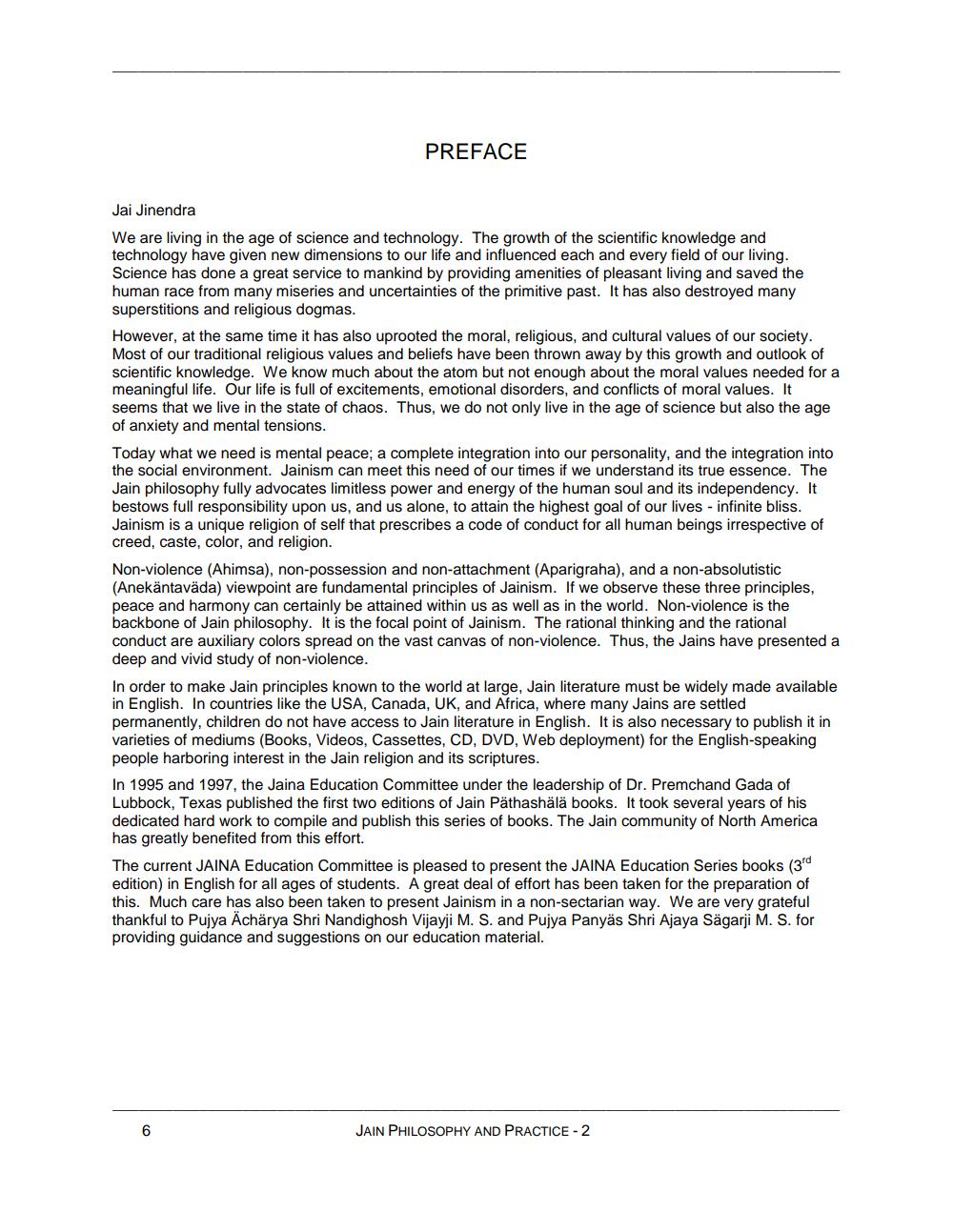Book Title: $JES 401 Jain Philosophy and Practice 2 Level 4 Book Author(s): JAINA Education Committee Publisher: JAINA Education Committee View full book textPage 6
________________ PREFACE Jai Jinendra We are living in the age of science and technology. The growth of the scientific knowledge and technology have given new dimensions to our life and influenced each and every field of our living. Science has done a great service to mankind by providing amenities of pleasant living and saved the human race from many miseries and uncertainties of the primitive past. It has also destroyed many superstitions and religious dogmas. However, at the same time it has also uprooted the moral, religious, and cultural values of our society. Most of our traditional religious values and beliefs have been thrown away by this growth and outlook of scientific knowledge. We know much about the atom but not enough about the moral values needed for a meaningful life. Our life is full of excitements, emotional disorders, and conflicts of moral values. It seems that we live in the state of chaos. Thus, we do not only live in the age of science but also the age of anxiety and mental tensions. Today what we need is mental peace; a complete integration into our personality, and the integration into the social environment. Jainism can meet this need of our times if we understand its true essence. The Jain philosophy fully advocates limitless power and energy of the human soul and its independency. It bestows full responsibility upon us, and us alone, to attain the highest goal of our lives - infinite bliss. Jainism is a unique religion of self that prescribes a code of conduct for all human beings irrespective of creed, caste, color, and religion. Non-violence (Ahimsa), non possession and non-attachment (Aparigraha), and a non-absolutistic (Anekäntaväda) viewpoint are fundamental principles of Jainism. If we observe these three principles, peace and harmony can certainly be attained within us as well as in the world. Non-violence is the backbone of Jain philosophy. It is the focal point of Jainism. The rational thinking and the rational conduct are auxiliary colors spread on the vast canvas of non-violence. Thus, the Jains have presented a deep and vivid study of non-violence. In order to make Jain principles known to the world at large, Jain literature must be widely made available in English. In countries like the USA, Canada, UK, and Africa, where many Jains are settled permanently, children do not have access to Jain literature in English. It is also necessary to publish it in varieties of mediums (Books, Videos, Cassettes, CD, DVD, Web deployment) for the English-speaking people harboring interest in the Jain religion and its scriptures. In 1995 and 1997, the Jaina Education Committee under the leadership of Dr. Premchand Gada of Lubbock, Texas published the first two editions of Jain Päthashälä books. It took several years of his dedicated hard work to compile and publish this series of books. The Jain community of North America has greatly benefited from this effort. The current JAINA Education Committee is pleased to present the JAINA Education Series books (30 edition) in English for all ages of students. A great deal of effort has been taken for the preparation of this. Much care has also been taken to present Jainism in a non-sectarian way. We are very grateful thankful to Pujya Acharya Shri Nandighosh Vijayji M. S. and Pujya Panyas Shri Ajaya Sägarji M. S. for providing guidance and suggestions on our education material. JAIN PHILOSOPHY AND PRACTICE -2Page Navigation
1 ... 4 5 6 7 8 9 10 11 12 13 14 15 16 17 18 19 20 21 22 23 24 25 26 27 28 29 30 31 32 33 34 35 36 37 38 39 40 41 42 43 44 45 46 47 48 49 50 51 52 53 54 55 56 57 58 59 60 61 62 ... 268
